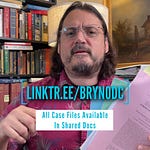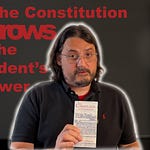I've been creating content about law and civics for several months now, and have frequently encountered the same phenomenon. I'll make a video on a subject, usually attempting to give a basic, first-year law student level overview, scrubbed of any issues that are controversial or up for argument. It's not that I am afraid to argue, but I want my viewers to have a firm understanding of the concrete foundations first.
Suddenly, I will find myself enduring a barrage of comments challenging one particular aspect of the subject I am teaching. More often than not, it will be an obscure and rarely used footnote from some dusty corner of the law. It will, without fail, be misapplied, but most surprisingly, it will be attacked by several different viewers, using nearly identical language.
I've experienced this phenomenon so frequently that it's become sort of a grander experiment: to stick to non-controversial topics almost at all costs, so that I have the opportunity to document the sources of these attacks on well-settled and elementary principles of law.
Over time, I've tracked these attacks to two primary sources.
The first are what I'll call "snake oil salesmen.” These are YouTube evangelists selling their unique understanding of law and history, alongside a series of books, merchandise, or live performances, who have slowly gaslit a particular following of people into believing that this person alone understands the law. The snake oil salesman usually has no background in actual law, and is more likely to be heavily rooted in a particular religious theology that they are masquerading as a legal philosophy, or some similar ideological background. It is often possible to find videos of their followers failing to successfully argue their doctrines in courts across the country. I have even been told by viewers that all I need to do is watch videos by one such evangelist or another, and I will finally understand.
The other source of these sudden and fascinating challenges is somehow more troubling. These tend to occur when a particular politician or political operative makes the rounds on the Sunday news programs, arguing that a certain action by a politician is justified because of a legal doctrine only discussed in novels written by retired law professors. The doctrine chosen is always obscure, because the general public is not meant to recognize it. Under the best circumstances, most attorneys may not even recognize it, or certainly not know it well enough to argue. And I will suddenly be berated by 20 scholars on such a doctrine, who will explain to me why this politician was perfectly within his or her rights to act as he or she did.
In the past 48 hours, I had such an experience when the president appeared to ignore a federal district court order to return a plane full of immigrants being deported. Suddenly, a rash of comments informed me that the case was not "justiciable," as it fell under the “political question doctrine,” and therefore the judge lacked jurisdiction and the president was not required to follow the order. Google reports that searches for the word "justiciable" spiked nearly exponentially in this past week of March, and it didn't take a major leap to determine that someone was traveling the news circuits feeding this misinterpretation of the law to a public searching for a reason to justify the president's actions.
In response, I made this video, one that, more than most of my videos, directly calls out those willing to lie to their audience to gain political advantage. I cannot promise to always create non-partisan content that avoids contentious issues. I do this to maximize the reach of what I believe to be incredibly important information. But if there is anyone I seek to bring down in my mission, it is those who would use their education, their understanding, their knowledge, be it of the law or anything else, specifically to mislead and disadvantage those who have not had the opportunity to attend an ivy league law school.
Whoever is spreading this information knows exactly what "justiciable" means. This person understands the political question doctrine. This person likely knows the four ways that the Court has applied the political question doctrine in foreign relations questions in the past, and knows that this case is not within the current bounds of the court's use of the doctrine. Most importantly, this person is well aware that the president is not allowed to unilaterally decide that a federal court lacks jurisdiction.
Unlike the Snake Oil Salesman, this Snake Oil Lawyer, fully trained, likely from an Ivy League law school, is well aware that the remedy he or she offers is bunk, and is more than willing to feed it to a desperate public. The Snake Oil Lawyer uses the public's limited knowledge of the law as a weapon to further an anti-constitutional agenda under the guise of constitutionalism. This person is, to me, the lowest and most detestable of the legal or political charlatan.
I may not have this person's platform. I may not be on the Sunday shows. But if you guys will listen, I can teach you how the separation of powers work. I can teach the meaning of jurisdiction and justiciability. And I can explain the history of the political question doctrine. Because this is your law. And you deserve to understand it.












Share this post